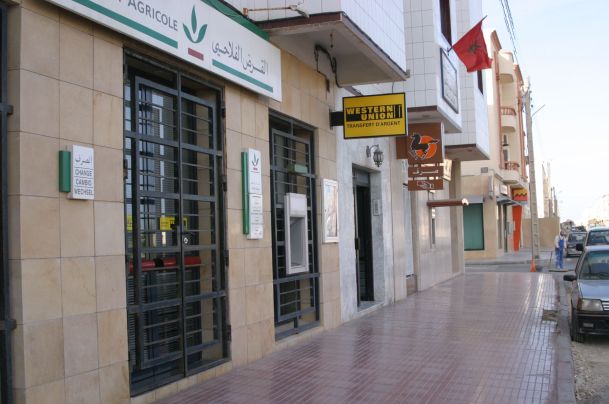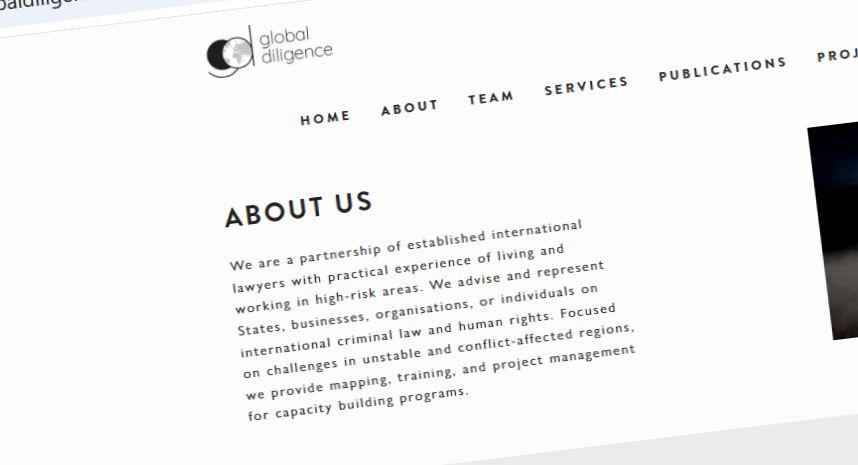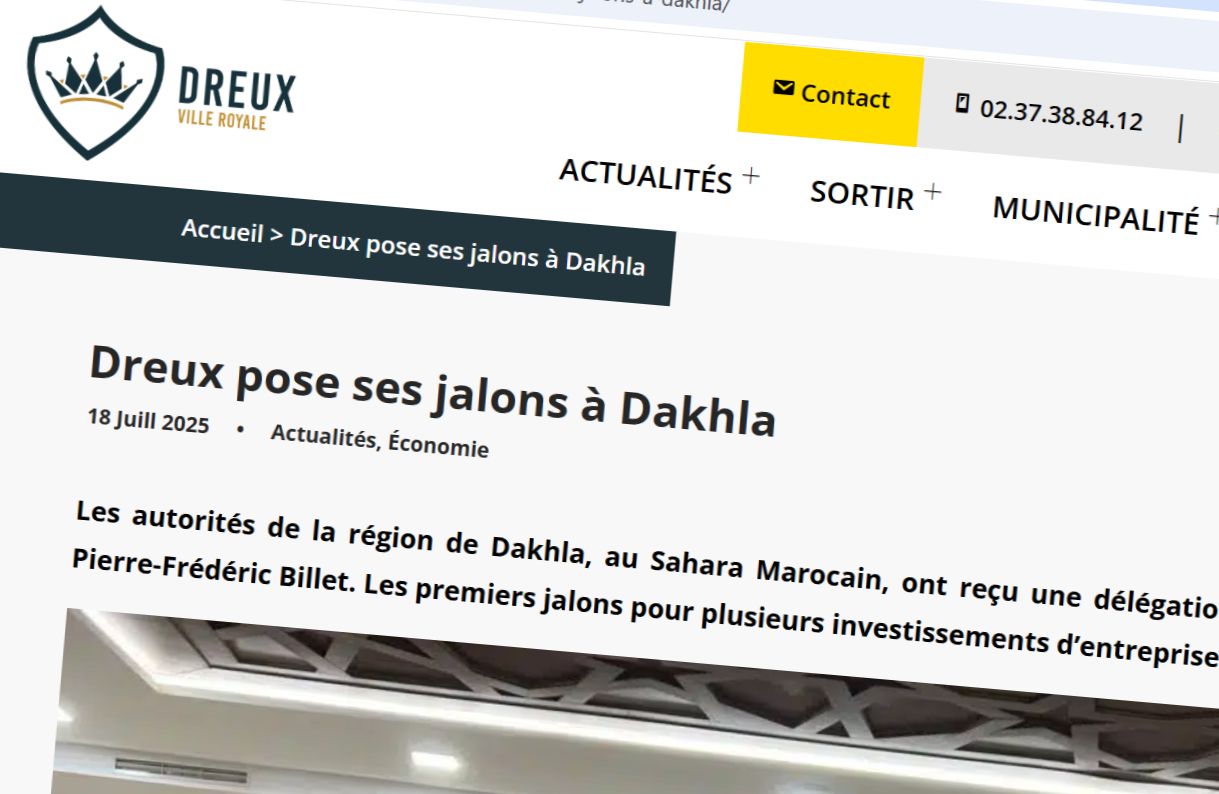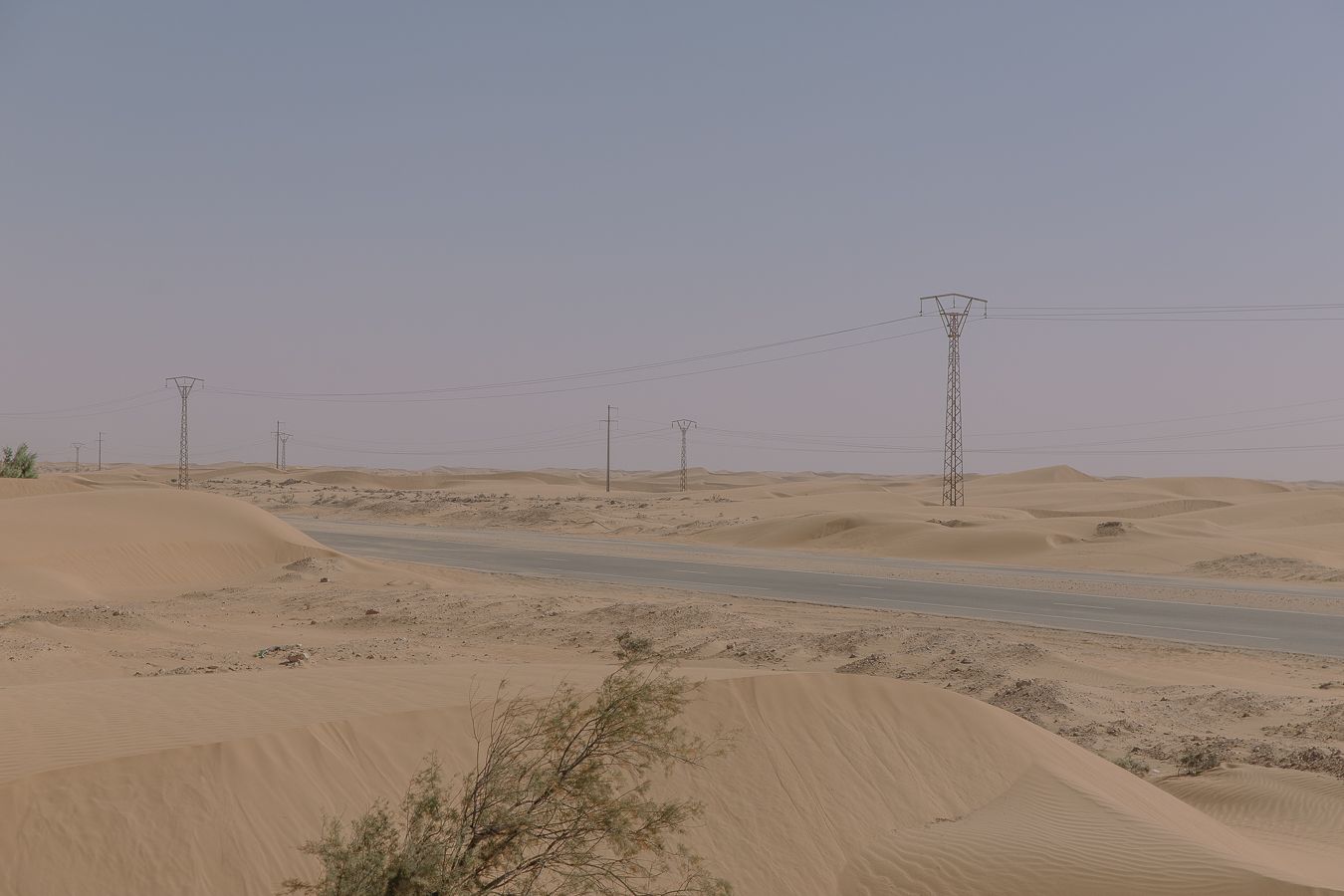
Während die Europäische Bank für Wiederaufbau und Entwicklung neue Kredite in Millionenhöhe für Marokkos grüne Energiewende bereitstellt, bleibt unklar, ob die internationale Bank auch umstrittene Geschäfte in der besetzten Westsahara finanzieren wird.
Am 16.02.2022 kündigte die Europäische Bank für Wiederaufbau und Entwicklung (EBWE) ein umfangreiches Unterstützungspaket für marokkanische Unternehmen im Rahmen der wichtigen Energiewende an. Wird dieses Geld jedoch in der besetzten Westsahara verwendet werden?
Die Bank hat sich dazu in der Vergangenheit nur vage geäußert, wie der Schriftverkehr zwischen der in London ansässigen Bank und Western Sahara Campaign UK zeigt (siehe unten für den vollständigen Schriftwechsel).
Die Bank hat sich bisher geweigert, auf Fragen zu antworten, die mit der Klärung des geografischen Geltungsbereichs ihres Mitgliedsstaates Marokko zusammenhängen. Wiederholt hat sie angedeutet, dass sie durchaus Projekte in den besetzten Gebieten außerhalb der international anerkannten Grenzen Marokkos zulassen könnte. Im Jahr 2014 berichtete die EBWE sogar, dass sie ein Fischereiexportunternehmen in El Aaiun unterstützt habe, wobei sie den Standort der Fabrik "Laayoune au Maroc" nannte.
Das neue Darlehen wird gemeinsam mit dem Green Climate Fund und der Europäischen Union vergeben. Es beinhaltet "die Bereitstellung eines Finanzpakets von bis zu 25 Millionen Euro für Crédit du Maroc, um Marokkos grünen Wende zu fördern". Die EBWE erklärte, dass 18,75 Millionen Euro von ihr kommen werden, während 6,25 Millionen Euro vom Green Climate Fund bereitgestellt werden.

Das Darlehen wird Crédit du Maroc gewährt, die das Programm umsetzen wird. Crédit du Maroc ist eine Tochtergesellschaft von Crédit Agricole, die wiederum sechs Agenturen in den besetzten Gebieten unterhält. Western Sahara Resource Watch (WSRW) schrieb Crédit Agricole im Dezember 2021 wegen ihrer Präsenz in der Westsahara, aber das Unternehmen hat noch nicht geantwortet.
Der Inhalt der Green Economy Financing Facility der EBWE ist auf einer dem Programm gewidmeten EBWE-Website zusammengefasst. Die Mittel werden "an kleine und mittlere Unternehmen sowie an Unternehmen für Investitionen in Technologien zur Eindämmung des Klimawandels und zur Anpassung an diesen vergeben".
Dies ist das vierte Mal, dass die EBWE ein großes Darlehen für die Energiewende in Marokko gewährt. In den Jahren 2021 und 2022 wurden insgesamt 50 Millionen Euro an ungesicherten Krediten an die beiden marokkanischen Banken Société Générale Maroc und BMCI vergeben - beide Banken haben Niederlassungen in den besetzten Gebieten. Im Jahr 2019 wurde ein Darlehen an die marokkanische Bank BMCE vergeben, die auf ein Schreiben von Western Sahara Campaign UK nicht geantwortet hat. Der gesamte nachfolgende Schriftverkehr entstammt dem Verständnis der EBWE, wo solche Mittel gemäß des EBWE-BMCE-Pakets verwendet werden können.
Im Jahr 2015, als die EBWE ihre Länderstrategie für Marokko überarbeitete, reichte WSRW eine Reihe von Anmerkungen zu dem Strategieentwurf ein. Die Anmerkungen wurden von der Bank zur Kenntnis genommen, aber der geografische Geltungsbereich der Strategie wurde nicht präzisiert.
Am 28. März 2022 gab EBWE bekannt, dass sie ihre nächste Jahresversammlung im Mai in Marrakesch abhalten wird. In Bezug auf die besetzten Teile der Ukraine zeigt sich die Bank weniger vage und verurteilt die russische Invasion. In einem Papier des Policy Department des Europäischen Parlaments wird ein kohärentes Vorgehen der EU gegenüber den Besetzungen in der EU-Nachbarschaft, wie der Krim und der Westsahara, gefordert.
Marokkos illegale und brutale Invasion der Westsahara hat die Hälfte der Bevölkerung des Gebiets zur Flucht veranlasst. Marokko verweigert dem sahrauischen Volk das Recht auf Selbstbestimmung und seine grundlegenden Menschenrechte.
Die Europäische Investitionsbank, die Europäische Kommission und die deutsche Kreditanstalt für Wiederaufbau haben deutlich gemacht, dass sie keine Projekte in der besetzten Westsahara unterstützen können.
Der Briefwechsel zwischen WSCUK und EBWE (englisch)
- WSCUK to EBRD 22 January 2019. WSCUK asks if the country strategy for Morocco is applicable to the territory of ‘Morocco’, as defined by the ECJ, or whether it also applies to areas outside of the internationally recognised borders and what mechanisms are in place “to ensure that the funds loaned to BCME will not end up funding projects in the occupied territory that Morocco holds under military occupation”.
- EBRD to WSCUK on 4 February 2019. The bank mentions that its strategy applies to “Morocco”; but without giving any further clarification as to what that means to them. EBRD failed to answer the two questions above. The bank underlines that sub-projects that fall under its support have to be “reviewed by EBRD".
- WSCUK to EBRD 7 March 2019. As EBRD had failed to clearly respond to the geographical application of its support, these questions were repeated. It was also asked whether EBRD had reviewed "any projects that are or were partially or fully implemented and/or applicable to the territory", and what the outcome of such review was in that case.
- EBRD wrote WSCUK on 27 March 2019. The bank does not respond to any of the questions. Instead it notes that "while EBRD has taken note of key UN Resolutions regarding the Western Sahara issue in developing its Country Strategy for Morocco, the EBRD as an international financial institution does not take a position or express a formal view in relation to the status of disputed territories. Without prejudice to the foregoing, the Bank reiterates that the current Country Strategy for Morocco does not envisage EBRD investment operations in the Western Sahara".
- WSCUK wrote EBRD on 29 May 2020. WSCUK questions why EBRD calls the territory “disputed” taking into account the clear legal status of the territory. In addition, the organisation asks another five questions:
"Concerned that the EBRD might view the territory differently from international courts, we took the liberty of looking into how the EBRD has addressed and referred to Western Sahara in other contexts on its website.This research has led us to ask you the questions below. We would be grateful if you could provide separate answers for each of the points we raise:
In 2018, EBRD published a report called ‘The investor base of securities markets in the EBRD region’. From what we understand, EBRD defines Morocco to be part of the region it works in. The mentioned report includes a reference to the bank ‘Banque Populaire de Laâyoune’. See: https://www.wsrw.org/files/dated/2020-04-09/ipreo_ebrd_report_13.04.18.pdf
1. Is it the EBRD’s opinion that the city of El Aaiun – which is the location of this particular company – is located within what it refers to as ‘the EBRD region’?
An EBRD presentation given in Casablanca in 2014, states that ‘Laayoune’ is located in Morocco. It furthermore states that EBRD’s Trade Facilitation Programme (TFP) assisted a company by the name of Iglo Fish, which is located in Western Sahara, to export frozen fish to an importer in Romania. “Iglo Fish SA. basé à Laayoune au Maroc vend des sardines congelées à un importateur basé à Bucarest en Roumanie. OTP Bank Romania émet une lettre de crédit, confirmée par BMCE Bank au Maroc. La BERD garantit jusqu’à 100% du risque de défaut de paiement commercial et politique.” https://www.wsrw.org/files/dated/2020-04-09/ebrd2015.pdf
2. Is the information presented in the above document accurate? The EBRD has facilitated trade for this particular company? If so, does it continue to do so?
According to your website, the TFP guarantees “are provided to international commercial banks thereby covering the political and commercial payment risk of transactions undertaken by issuing banks in the EBRD’s countries of operations.” It is set up to facilitate trade “to, from and amongst the EBRD countries”. There are 26 such countries.
3. Does the EBRD consider the company mentioned in the EBRD presentation above, Iglo Fish SA, to be located in any of these 26 countries?
4. Have other companies located in Western Sahara received such assistance over the last decade? If so, which companies, and for what purpose?
5. In view of the ICJ’s stating that Morocco’s claims to Western Sahara are unfounded, that the CJEU calls Western Sahara ‘separate and distinct’ from the territory of Morocco, and that the CJEU states that consent has to be obtained upon dealing with the territory: Did EBRD seek consent from the people of Western Sahara to facilitate trade from their territory?- EBRD wrote WSCUK on 25 June 2020. None of the questions regarding the geographical limitation of Morocco vs. Western Sahara were addressed. Regarding the support to Iglo Fish, the EBRD wrote: “EBRD has no on-going engagement with the stated company, Iglo Fish SA in the Western Sahara in the city of El Aaiun. Every project is reviewed in the development stage, which includes environmental, social and political reviews. Local communities are being engaged when stakeholder engagement plans are developed”.
Da Sie schon ein Mal hier sind....
Die Arbeit von WSRW wird mehr denn je gelesen und genutzt. Sie ist zum überwiegenden Teil ehrenamtlich, sie erfordert Zeit, Hingabe und Sorgfalt. Aber wir tun sie, weil wir glauben, dass sie wichtig ist - und wir hoffen, dass Sie das auch tun. Mit einer kleinen monatlichen Unterstützung können sie einen wichtigen Beitrag dazu leisten, die Zukunft von WSRW zu sichern und dafür sorgen, dass wir weiterhin unseren komplett unabhängigen Recherchen nachgehen können. Vielen Dank für ihre Spende!
Global Diligence verteidigt Aktivitäten in besetzten Gebieten
Die Rechtsberatungsfirma Global Diligence, die sich als Experte für „verstärkte Sorgfaltspflicht“ präsentiert, stellt die völkerrechtliche Situation in der besetzten Westsahara falsch dar.
Französisches Staatsunternehmen plant Energieprojekt in der besetzten Westsahara
Die französische Stadt Dreux erwägt, ein Urteil französischer Gerichte zu ignorieren und sich an einem umstrittenen Energieprojekt in der besetzten Westsahara zu beteiligen.
Marokko treibt Pläne für gigantische Wasserstoffproduktion in besetzter Westsahara voran
Die marokkanische Regierung hat mehrere Projekte für grünen Wasserstoff mit einer Gesamtleistung von 20 GW aus erneuerbaren Energien und bis zu 8 Millionen Tonnen Derivaten bestätigt – viele davon sind in der besetzten Westsahara geplant.
Marokko plant riesiges KI-Zentrum in der besetzten Westsahara
In dem besetzten Gebiet ist ein 500-MW-Hyperscale-Rechenzentrum für künstliche Intelligenz geplant.



